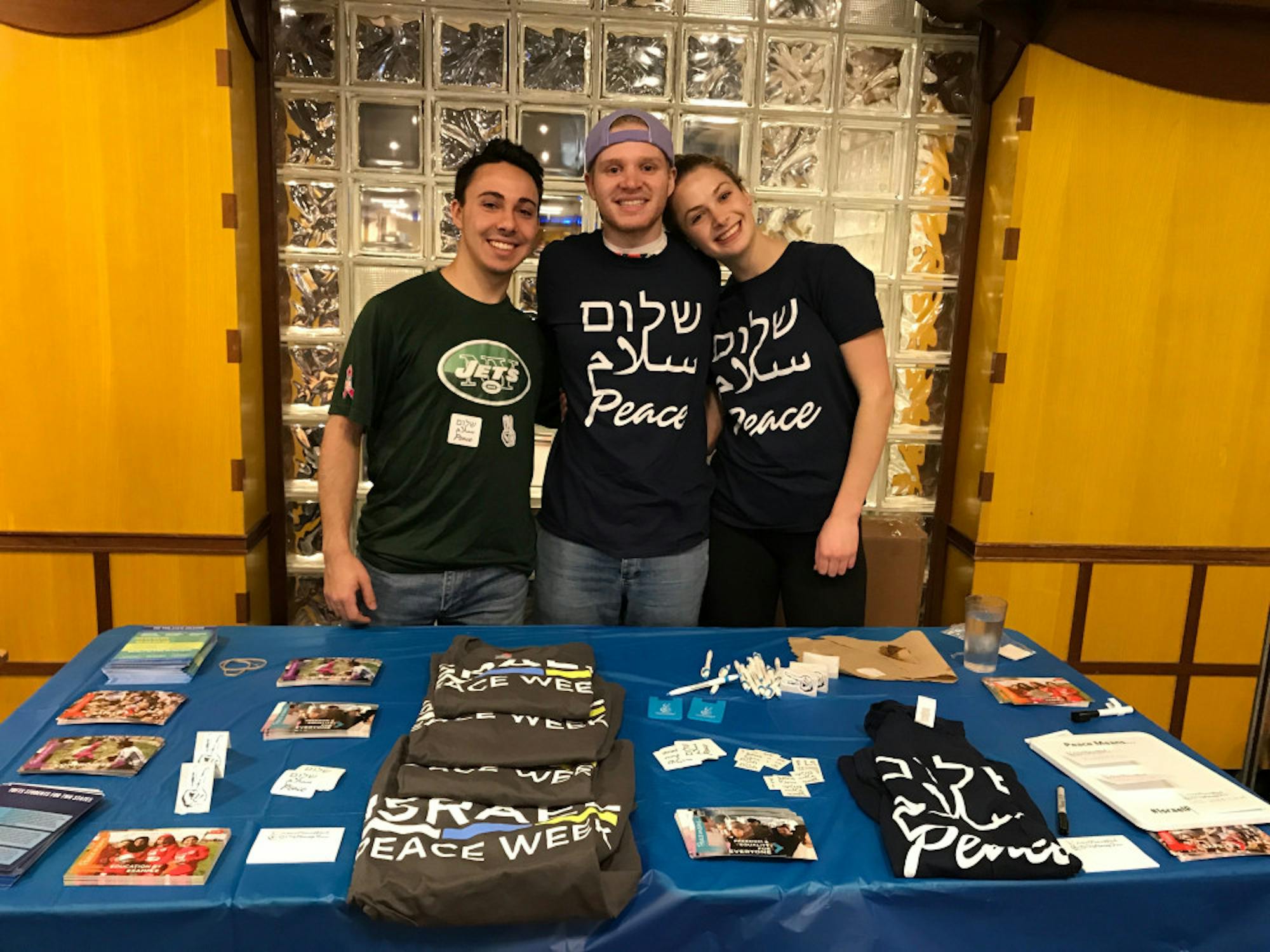Tufts Students for Two States (TS4TS) hosted the inaugural Two States Week: A Series to Promote Peace last week, which provided an open space to learn and discuss the two-state solution to the Israeli-Palestinian conflict, according to the Tufts Hillel website.
TS4TS is a coalition between Friends of Israel (FOI), J Street U and Tufts Hillel, all of whom are united in their belief that the two-state solution is the best way to promote peace, security and prosperity in the Israeli-Palestinian region, according to Friends of Israel co-president Spencer Zeff, a sophomore.
“While we come to this topic with through different tactics, we at the end have the same goal," J Street U co-chair Madeline Oliff, a sophomore, said. "I think it was a powerful week in the sense that we were able to lift up so many different voices and methods toward working towards the two-state solution.”
The series of events started on Tuesday, April 17, after the long weekend, with tabling in Carmichael Dining Center and a lecture entitled "From Sierra Leone to Israel: A Story of Activism and Peace," according to Zeff. Pandit Mami, an advocate for peace and fighter against the use of child soldiers, shared his personal story about how Israel factors into Sierra Leone's development, according to the Tufts Hillel website.
On Wednesday, TS4TS hosted "Ishmael Khaldi: A Shepherd’s Journey," where Ishmael Khaldi, Israel’s first Bedouin diplomat and current policy advisor to Israel’s Minister of Foreign Affairs Avigdor Lieberman, discussed his work for peace, according to Zeff.
In Carmichael Hall on Thursday, J Street U tabled about their campaign to stop village demolitions in the West Bank, and Friends of Israel tabled about various peace projects, according to Zeff and Oliff.
On Friday, Deputy Israeli Consul General to New England Matan Zamir presented his work on sustainability and peace at a pre-neg, or preceding service, to Hillel’s semesterly Farm to Table Shabbat, according to Zeff.
"Since Hillel was also hosting Farm to Table Shabbat that evening, we thought this was a nice opportunity for students who were interested in this topic to connect their Shabbat experience to Two States Week," Tufts Hillel Program Associate Sara Legasey wrote in an email.
Two States Week comes a week after Students for Justice in Palestine (SJP) hosted Israeli Apartheid Week, a series of events that seeks to highlight the experiences of Palestinians in Israel.
Zeff and Oliff explained that Two States Week, conceived earlier in January and planned throughout the semester, was not a response to Israeli Apartheid Week, but instead meant to continue the conversation about the Israeli-Palestinian conflict and what a two-state solution would mean.
“As students for two-states, we just want to make sure that our voice and perspective is heard on campus," Oliff said. "We are not meaning to challenge any perspective, because ... by being a coalition and not just a mere club we are open to discussion and debate."
While TS4TS was happy with the turnout for the week's events, they also hope to reach out to individuals who actively disagree with the two-state solution.
"One of the things that has disappointed me is how vocal people are [about the conflict] on social media, but are unwilling to come to events and discuss it with people in person," Zeff said. "I hope one day students will feel comfortable enough to go to other organizations' events. We can only learn from each other."
Junior Amira Al-Subaey, a member of Tufts Students for Justice in Palestine who was involved in planning Israel Apartheid Week, outlined her understanding of rhetoric that understands the two-state solution as a route to peace.
"Discussions 'promoting peace' cannot solely center the political objective of two states, instead we must center an end to the occupation, an end to ongoing illegal settlements, the right to return for all Palestinians, and the liberation of Palestine. We must center justice if we are working towards peace," Al-Subaey said in an electronic message. "I think this conversation often treats Palestine and Israel as two equal sides, but this rhetoric fails to address the systemic discrimination Palestinians face. In this way, advocacy for two-state solution and for peace must hold Israel accountable to [its] documented history of state-sanctioned violence against Palestinians and it’s ongoing infringement of Palestinians' human rights."
This was the first Two States Week, but TS4TS looks forward to making it an annual event.
“This was the first time we have run a Two States Week. We had only planned and discussed it for this year, though that’s not to say we wouldn’t also potentially be interested in making it an annual event,” Legasey wrote. “We were proud of the programs offered throughout the week and glad to see so many new people getting involved and learning about the two-state solution, so it’s definitely a program we would be happy to support in the future if it continues to be a project that students are passionate about.”
Inaugural 'Two States Week' continues campus discussion on Israeli-Palestinian conflict

Students table in Carmichael Dining Center during Tufts Students for Two States week.





